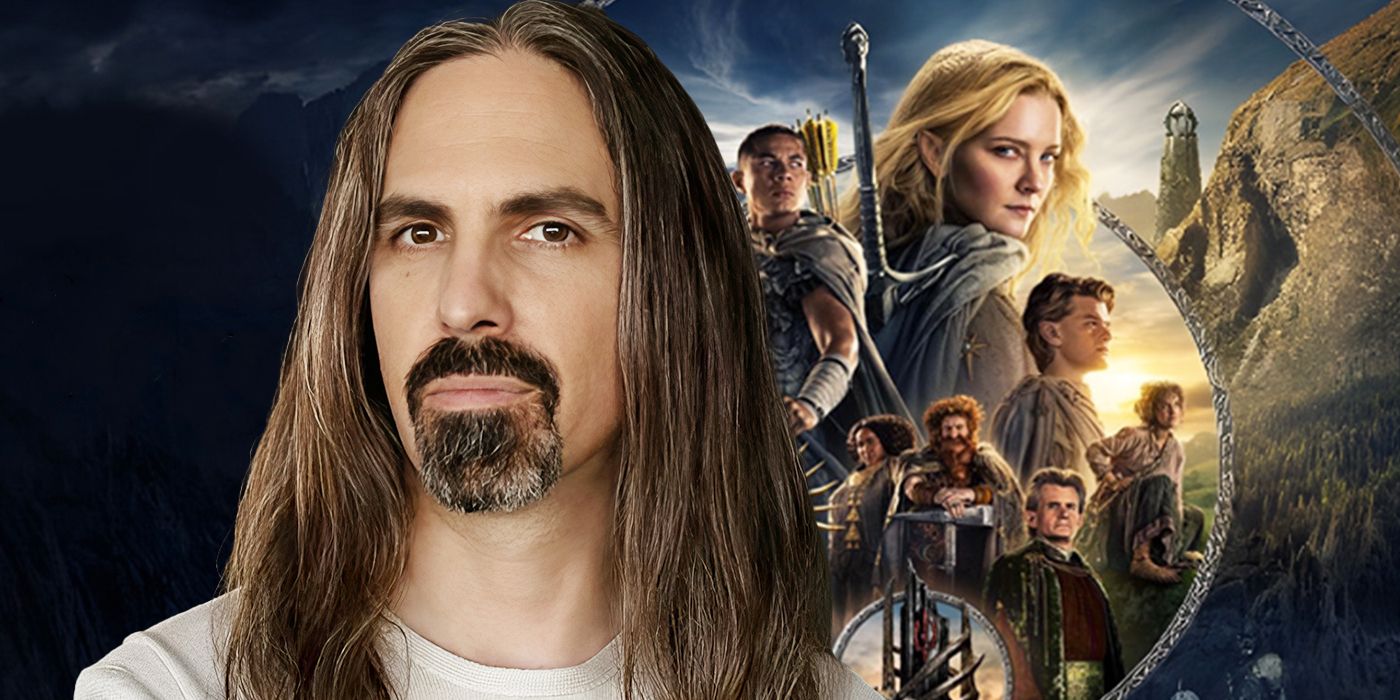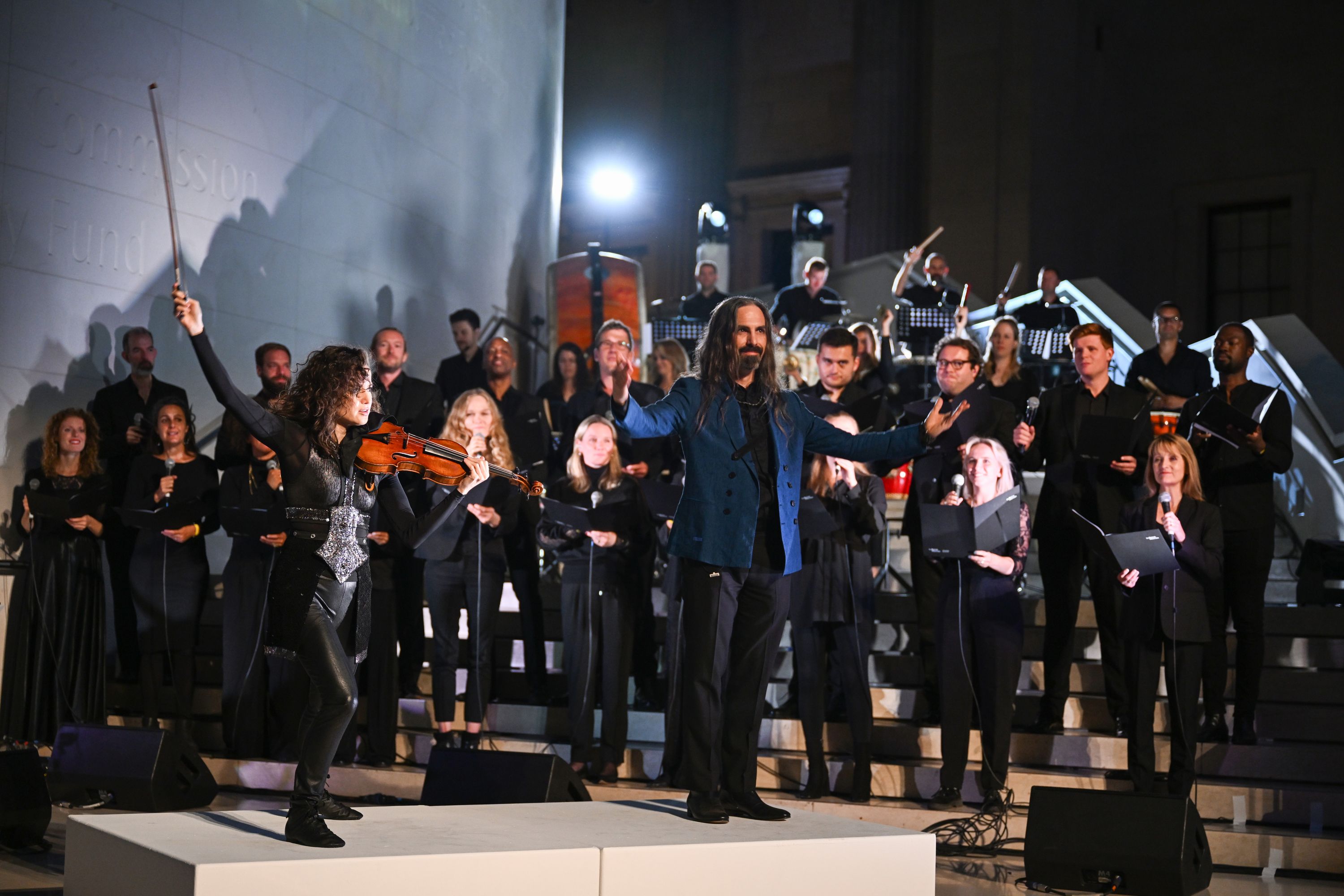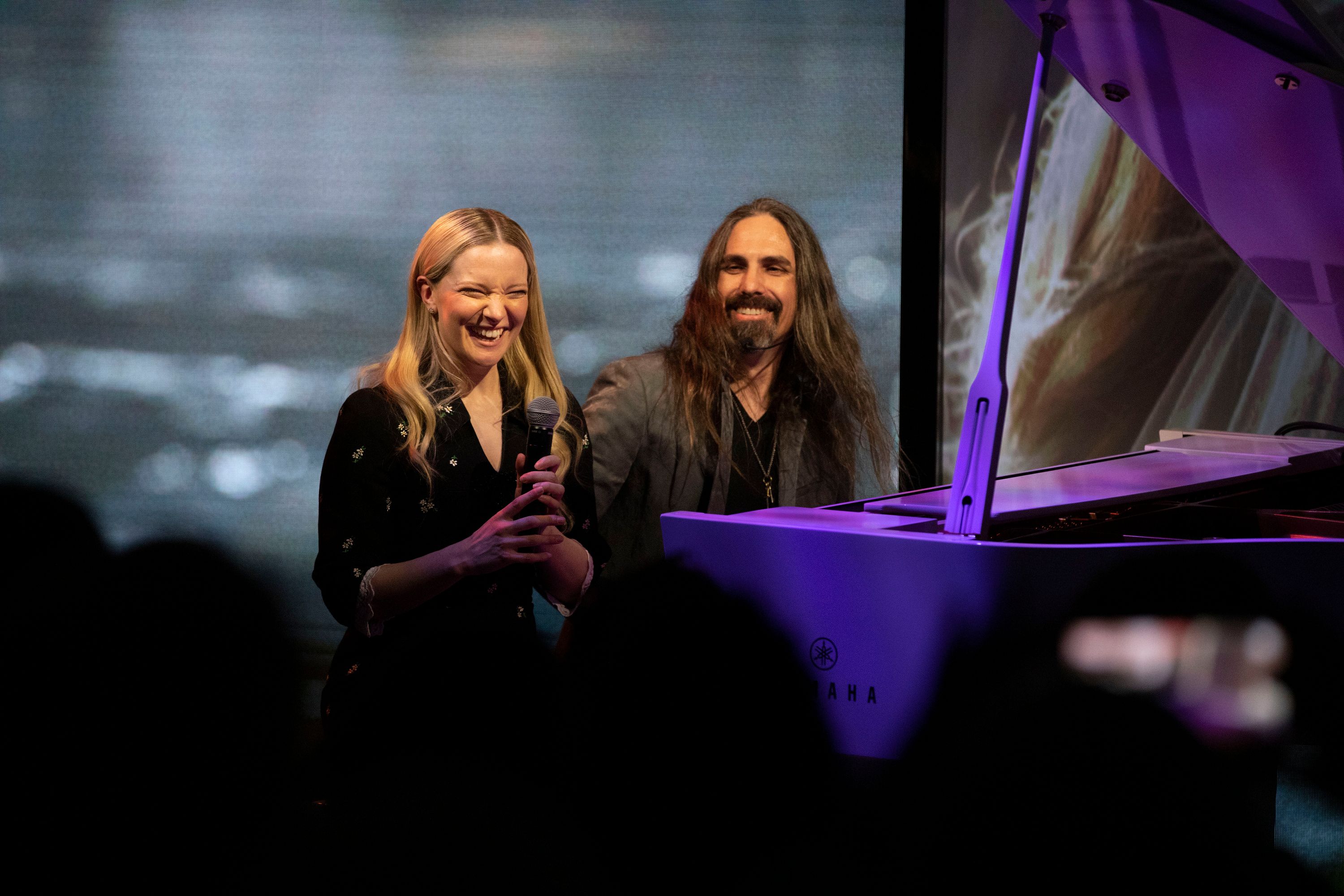Every element of Patrcik McKay and John D. Payne’s series, The Lord of the Rings: The Rings of Power, was carefully researched and designed to bring J.R.R. Tolkien’s vision of the Second Age to the screen in a whole new way. With production well underway, one crucial piece of the puzzle remained. Composer Bear McCreary tells Collider’s Steve Weintraub that due to COVID delays, he was hired to craft a full score befitting Middle-earth’s Second Age in only nine months.
During their interview, McCreary admits the task at hand was a daunting one, considering that “without the music, it wouldn't work because you have to feel emotion so intense.” The cast and creatives of Rings of Power had the unique opportunity to put previously-unseen moments from Tolkien’s legacy up onscreen, meaning McCreary’s score would be the backdrop for Morfydd Clark’s Galadriel as she made her decision to journey to Valinor, or introducing Khazad-dûm long before its decimation. It also meant that his take on Middle-earth would follow Howard Shore’s unforgettable work on Peter Jackson’s trilogy, but he tells Weintraub this pressure didn’t factor into his job at hand. “I was so excited to be able to tell part of Tolkien's legendarium,” McCreary tells us, “the pressure part of it never really occurred to me.”
During their interview, which you can watch or read below, McCreary shares why starting out on a “big-budget reimagining of a sci-fi classic” like Battlestar Galactica and training under Ghostbuster’s composer, Elmer Bernstein, prepared him for the creative “marathon” that was scoring Rings of Power. He discusses the gratitude of being a part of something so iconic, which moments were his favorite to score, and why every single production detail is necessary to composing music for each project he works on. Rings of Power Season 1 is available to stream on Prime Video, and also stars Charlie Vickers, Lenny Henry, Robert Aramayo, Ismael Cruz Córdova, Owain Arthur, and Sophia Nomvete.
COLLIDER: I have a ton of questions about Rings of Power, loved your work on it, but I definitely have to start with, how did Battlestar Galactica change your life? Because that's where I first heard your music and became a fan.
BEAR MCCREARY: Battlestar Galactica was my first job as a composer. To say that it changed my life is the understatement of the century. Realistically speaking, no one should let a 24-year-old child score their big-budget reimagining of a sci-fi classic, and it was a combination of luck and hard work and diligence that I survived that gauntlet. I did one episode, which happened to be 33, I worked on the miniseries, but then I happened to do Episode 1 from Season 1, and then they let me do another episode, let me do another episode, and there it was. I mean, it was fascinating because, to me, Battlestar gave me half of the pieces that I needed to do a show like Rings of Power. It forced me to learn so many modern techniques, not only about production and samples, and producing a score in the 21st century, but storytelling. I mean, Battlestar was– it doesn't sound it now, but then, that was not how you scored sci-fi space operas on TV. It was a very modern approach.
But the other half of my personality, the other half of my skill set, is a much more traditional one. I studied under Elmer Bernstein. I studied under the guy who wrote The Ten Commandments, man, he scored Ghostbusters, it's on your shirt! So he taught me the absolute fundamentals of dramatic storytelling, and orchestral writing and filmmaking, and how to talk with a filmmaker. So, you take that skill set, that very old-school skill set, suddenly I'm thrown into a Battlestar Galactica, I'm learning all these modern things, though there was a lot of orchestral writing, not really kind of an old-school score. It was a very modern score at the time, but you can see how, to do The Rings of Power, on a television schedule in the modern era, it really took both of those sides of my personality and my experience to do that. And , you know, Battlestar was everything to me, man. It opened doors, it taught me how to find my own voice as an artist, and it made my name something that people were aware of much earlier in my career than it would have otherwise. So, I'm very grateful to everybody at that show for taking a chance on me because, boy, did they take a chance on me.
100%. With Rings of Power, did you actually debate, at all, taking the job because of how there's so many fans that are going to have feelings either way, or were you sort of like, “I'm doing this?”
MCCREARY: Steve, I was all in. The minute it was announced, I thought, “I have to do this. I have to do this.” And it's funny because only later in press interviews, when people ask, “Well, what did you do? What about the pressure of following Howard Shore?” that I thought, “Oh yeah, that was there!” But I was so excited to be able to tell part of Tolkien's legendarium, you know, to be a part of this story coming to screen. I was so excited to do that, that the pressure part of it never really occurred to me. Because if you think about it, right? If my brain were even wired to think that way, then I couldn't even get out of bed and come into the studio. I mean, you can't get out of bed and say, “Write a piece of music that's gonna be as good as “The Shire” theme.” I mean, dude, you can't. So, it really wasn't even– I think I accidentally put blinders on, and just thought, “I'm gonna dive in, and who's Nori? I'm gonna write a theme for this character! Who's Galadriel?” Like, “Let's figure this out. Let me write something for her!”
So in a way, my naivete helps me. Not to go back to Battlestar, but I mean, Battlestar, I was 24. It's like, “Oh, you can do one episode.” Alright, well, if you think about it, like, if I succeed, I can have a career, and if I fail it's over – I can't be creative in that environment. I was just grateful to have a story to tell that inspired me, and have some skill set that I have honed to think, “Let me use those skills and tell this story,” like, I'm so lucky. It's gratitude, man. It's gratitude is what I felt more than anything else.
Do you have a favorite theme or scene from Season 1 that you're especially proud of that, if someone hasn't seen the show, that's the piece of music they should seek out first?
MCCREARY: No, it's very hard to say. There are so many that I'm delighted by. I love coming into Númenor in 103, coming into Khazad-dûm in 102. I feel like those were places where I get to make a big statement and say, “Welcome to this version of Middle-earth!” With that said, those are not really favorite moments. My favorite moments are much more subtle, they're character moments. When Elrond, in the fourth episode, four or five, somewhere in there, he comes up to Durin, who's mad at his father, and he just says, “Hey, you think you have it bad? My dad was a star!” And he has this moment of bonding with him, and it's just this deescalation of tension, and you love these two characters, and I get to use both their themes. Moments like that really shine.
But if I had to pick one, it might be the end of the first episode where Galadriel makes a decision about whether or not she's gonna go to Valinor, and she looks in the lens, and it's one of these moments that is so lyrical and operatic that without the music, it wouldn't work because you have to feel emotion so intense. And it's such poetic, beautiful imagery. That might be the one. That's where I thought, you know, I've introduced this theme for her early in the episode, and I get to pay it off in this beautiful bookend, and that first episode is one of those kind of moments.
I've spoken to a lot of composers, are you writing music to the script or do you wait until you have footage? Talk a little bit about your writing process.
MCCREARY: My mentor was Elmer Bernstein, as I already mentioned, and he used to watch a movie a dozen times, and he would say the movie tells you what it needs. I am like that. Scripts are great, I understand structure and intention, but to start writing only from a script bypasses the contributions of actors, lighting, the DP, the editors, the effects, the production design, costumes; they all influence where my brain goes, so I have to see it. I'm a very visual person. And often, if I write from a script, I'll end up going the wrong direction because all those other people add to it. It's a little different with Rings of Power because I feel like I knew that IP so well, I was tempted to start. But even then, I didn't start until they sent me episodes I could look at.
I definitely have to ask you about Season 2 and if you have already started composing?
MCCREARY: I have, that's about all I can say at the moment, but it's gonna be awesome!
Yeah, I'm confident they're not gonna screw this thing up. How long did you actually spend doing music for Season 1, and was it something that you were just focused on, or were you also looking at other projects at the same time?
MCCREARY: Yeah, I was able to shuffle my deck to focus fully on this. And in fact, you know, I've been quite open as I talk about– I have a support staff that helps me do TV. It's the way you make TV scores in the 21st century, but I wrote every cue in the Rings of Power. I shuffled the deck so that they would help me on everything else. Because I really wanted to craft something where every moment was completely bespoke to the themes to the characters.
It was a challenge, I'm not gonna lie. I think because of COVID disrupting production schedule, the composer got hired real late on the Rings of Power, so I got hired and I had nine months to write nine hours. So I got hired and I started right away, and I did an hour a month. And so, in that nine months, I was in this studio writing anywhere from 12 to 15 hours a day, every day. And I took no more than seven, or maybe 10 days off, took a few days off for Christmas holiday, Thanksgiving Day, but that's it, man. I mean, that was it. And the toll on my mind on my body, on my muscles, it was intense. There's a reason people don't write nine hours of music in nine months. If that was a feature film or a series of films, that would be years, you could do that over years, so that was a marathon. But like I said, I feel like I was uniquely positioned; all my years studying with Elmer and just studying classic film. And yet, what was the majority of my experience has been television. I started in Battlestar, we did 20 episodes a year in Battlestar. So in a way, I was uniquely positioned to be able to just run that marathon, and survive it, and I'm proud of it, you know? I mean, I think the score benefited from that kind of total, almost monomaniacal focus that I gave it.
The Lord of the Rings: The Rings of Power Season 1 is available to stream on Prime Video. For more on the fantastic series, check out our interview with director J.A. Bayona.



